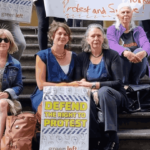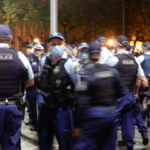The Offence of Damage, Destruction or Obstruction of Major Bridges, Roads and Tunnels in NSW

On Friday, 2 December 2022, climate activist Violet Coco was sentenced by a magistrate in Downing Centre Local Court to a full term of 15 months in prison with a minimum of nine months, for her part in a nonviolent protest.
An application for her release on bail pending an appeal to the District Court was then refused.
The crime of nonviolent protest
Ms Coco’s crime was to take part in the Fireproof Australia protest in Sydney on 13 April 2022, whereby those attempting to draw attention to the climate crisis facing the earth blocked one of the lanes of the Harbour Bridge with a van during peak hour and allegedly let off flares whilst standing on top of the vehicle.
The magistrate was scathing in her assessment of the conduct and clearly intended to send a strong message to both Ms Coco and other activists that they will be sent to prison for direct action if it temporarily inconveniences others, whether or not this occurs in the context of an environmental emergency, or in any other social or political context for that matter.
Sending an activist to prison for conduct which does not hurt anyone or damage property exemplifies the decaying state of democracy in Australia, and those who might applaud the NSW government for recently bolstering laws which curtail the right to protest, the police for arresting and charging Ms Coco and the magistrate for sending her to prison – when many who commit far more serious offences avoid such a fate – should think twice about what they’re celebrating, as it may someday affect their own ability to stand up for what they believe in.
The offence of damaging, destroying or obstructing major bridges, roads and tunnels
Since April 2022, damaging, destroying or obstructing major bridges, roads and tunnels has been an offence under section 144G of the Roads Act 1993 (NSW) which carries a maximum penalty of two years in prison and/or a fine of 200 penalty units.
A penalty unit is currently equivalent to $110, which means the maximum fine for the offence is $22,000.
To establish the offence, the prosecution must prove beyond reasonable doubt that the defendant:
- Entered, remained on, climbed, jumped from or otherwise trespassed on any part of the Harbour Bridge or any other major bridge, tunnel or road, and
- Caused damage to the bridge, tunnel or road, or seriously disrupted vehicles or pedestrians attempting to use it.
The section defines a serious disruption as including, but not being limited to, any part of the bridge, tunnel or road being closed, or any vehicles or pedestrians being redirected as a result of the conduct.
Statutory defence
The section states that a person is not guilty of the offence if able to prove to the court, on the balance of probabilities, that a reasonable excuse existed for the conduct.
A reasonable excuse expressly includes where the conduct arose due to a mechanical fault or breakdown of a motor vehicle.
Statutory exceptions
The section makes clear that the offence does not apply to conduct:
- At the place of the person’s work, or
- At a workplace owned, occupied, operated or used by the person’s employer.
The offence also does not apply to conduct at Parliament House or an office of a member of parliament.
It also does not apply to conduct that forms part of industrial action, or an industrial dispute or campaign.
General Legal defences
General legal defences apply the the charge of damaging, destroying or obstructing major bridges, roads and tunnel, including self-defence, duress and necessity.
In the event a defendant is able to raise evidence of a general legal defence, the onus then shifts to the prosecution to prove beyond a reasonable doubt that the defence does not apply in the circumstances.
If the prosecution is unable to do so, the defendant is entitled to an acquittal; in other words, a verdict of not guilty.
Going to court?
If you have been accused of a criminal offence and require the assistance of an experienced defence lawyer, call Sydney Criminal Lawyers anytime on (02) 9261 8881 to arrange a free first conference with a specialist criminal lawyer who will provide you with accurate advice and formidable legal representation.






